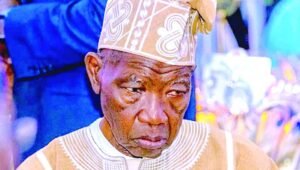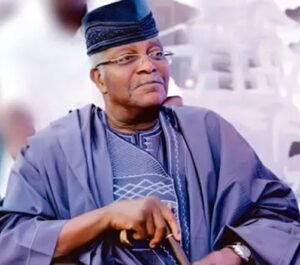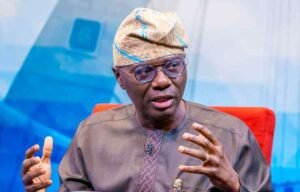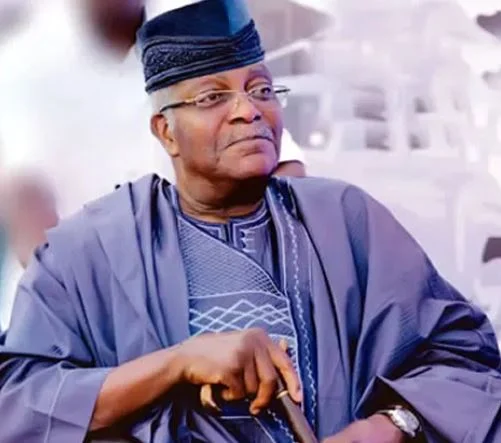Are you searching for who Lagos State’s first governor was, or how many military regimes it went through? This comprehensive guide dives into the history of Lagos, and provides a complete list of its governors, from the very first military administrator to the current ruling party.
You will also learn about:
- Who was the architect of free education in Lagos?
- When did Lagos become a state?
- Which governor oversaw the construction of iconic landmarks like the Eko Bridge?
READ ALSO: List Of Governors Of Osun State (1991-Present)
Complete List Of Past And Current Governors Of Lagos State
Name | Began Tenure | Ended Tenure | Party |
|---|---|---|---|
Brigadier Mobolaji Johnson | 27 May 1967 | July 1975 | Military |
Commodore Adekunle Lawal | July 1975 | 1977 | Military |
Commodore Ndubuisi Kanu | 1977 | July 1978 | Military |
Commodore Ebitu Ukiwe | July 1978 | October 1979 | Military |
Alhaji Lateef Jakande | October 1979 | December 1983 | UPN |
Air Commodore Gbolahan Mudasiru | January 1984 | August 1986 | Military |
Navy Captain Mike Akhigbe | August 1986 | July 1988 | Military |
Brigadier General Raji Rasaki | July 1988 | January 1992 | Military |
Sir Michael Otedola | January 1992 | November 1993 | NRC |
Colonel Olagunsoye Oyinlola | 9 December 1993 | 22 August 1996 | Military |
Colonel Mohammed Buba Marwa | 22 Aug 1996 | 29 May 1999 | Military |
Asiwaju Bola Tinubu | 29 May 1999 | 29 May 2007 | AD |
Mr. Babatunde Fashola | 29 May 2007 | 29 May 2015 | ACN |
Mr. Akinwunmi Ambode | 29 May 2015 | 29 May 2019 | APC |
Mr. Babajide Sanwo-Olu | 29 May 2019 | Incumbent | APC |
Who Was The First Civilian Governor Of Lagos State?

The first civilian governor of Lagos State was Lateef Kayode Jakande. He served from October 1, 1979, to December 31, 1983.
Jakande was born on July 29, 1929, in the Epetedo area of Lagos Island, Lagos State, and he started his career as a journalist and later became the editor-in-chief of the Nigerian Tribune.
Encouraged by Chief Obafemi Awolowo, Jakande moved into politics and ran for the governorship of Lagos State in 1979 under the Unity Party of Nigeria. He won the election and became the governor, defeating his opponents with a significant margin of votes.
Jakande’s administration concentrated on implementing policies that sought to uplift the lives of the people, especially the poor.
During his tenure, Jakande started different development projects, including the building of new schools and housing units.
He introduced free education at primary and secondary levels, constructed over 30,000 housing units in different areas of Lagos State, and founded institutions like the Lagos State University and the Nigerian Institute of Journalism.
Jakande’s government also invested in healthcare infrastructure, building hospitals and health centers across the state. Besides, he started the metro line project to improve mass transit in Lagos.
However, his tenure was cut short when the military seized power on December 31, 1983. After leaving office, he served as the Minister of Works under the Sani Abacha military regime, despite facing criticism for his association with the government.
Who Was The First Military Governor In Lagos State?

The first military governor of Lagos State was Brigadier Mobolaji Olufunso Johnson. He was the Military Administrator of the Federal Territory of Lagos from January 1966 to May 1967 during the military regime of General Aguyi-Ironsi.
After Lagos State was created in May 1967, Johnson became its first governor until July 1975. Born on February 9, 1936, in Lagos, British Nigeria, Johnson had a prominent military career.
He attended several schools, including Reagan Memorial Baptist School, Methodist Boys’ High School Lagos, Mons Officer Cadet School, and the Royal Military Academy, Sandhurst. During his tenure as governor, Johnson was involved in notable infrastructural development in Lagos State.
Some of his notable projects include the construction of the Lagos–Badagry Expressway, Toikin Bridge, Eko Bridge, Third Mainland Bridge, and the reclamation of the Bar Beach shoreline.
However, his administration also faced criticism for the unpopular demolition of the Ajele Cemetery, which displaced many buried there, including notable historical figures.
After retiring from the Nigerian Army in 1975, Johnson moved into private business and had leadership positions in organizations such as Julius Berger Nigeria and the Nigerian Conservation Foundation.
He was also involved in philanthropic activities and was the Chairman of the Board of Trustees of Methodist Boys’ High School, Lagos Old Boys’ National Association.
Mobolaji Johnson passed away on October 30, 2019, at the age of 83, but his legacy lives on through different infrastructure projects in Lagos State named after him, including roads, an avenue, a sports complex, and a housing scheme in Lekki. Also, a railway station in Ebute Metta, Lagos, was named in his honor.
Who Is The Governor Of Lagos State Currently?

Babajide Sanwo-Olu is the current Governor of Lagos State, assuming office on May 29, 2019. He’s a member of the All Progressives Congress (APC) party.
Born on June 25, 1965, Sanwo-Olu graduated from the University of Lagos and studied at the London Business School and the John F. Kennedy School of Government.
He also has a background in banking and has held executive positions in various financial institutions. Sanwo-Olu’s political career began in 2003 when he served as a Special Adviser in Lagos State.
And ever since, he has maintained different ranks in the state government, including Commissioner for Commerce and Industry, and Managing Director/CEO of the Lagos State Development and Property Corporation.
In 2018, Sanwo-Olu contested and won the APC gubernatorial primaries, defeating the incumbent governor. He won the Lagos State gubernatorial election in 2019 and was reelected in 2023.
Without being affected by legal challenges to his reelection, the Lagos State Governorship Election Petition Tribunal affirmed Sanwo-Olu’s victory.

